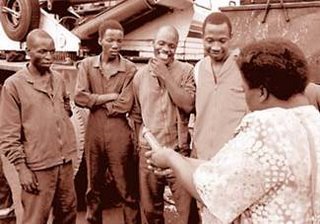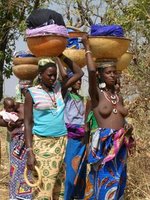
Inspired by Amnesty International's toolkit, palm impressions were organized at the event, symbolizing solidarity with those working against gender violence
At the Women’s Studies Research Center (WSRC), GaIDI Scholars hosted a synergy event inaugurating the 16 Days of Activism Against Gender Violence at Brandeis University. The event titled “Gender Violence Knows no Boundaries” was coordinated by Rajashree Ghosh, WSRC Visiting Scholar. GaIDI’s efforts at collaboration with the Gender Working Group (GWG) at the Heller School for Social Policy and Management have reached very exciting proportions and this event is representative of that very effort.
Shulamit Reinharz, Director, WSRC Director addressed the huge gathering of students, faculty and Scholars and welcomed participants to the Center. Dr. Reinharz expressed serious concern about gender violence that it is all-pervasive and is a violation of basic human rights.
Kelley Ready, Associate Director of Academics Sustainable International Development (SID) Program at the Heller School for Social Policy and Management reiterated her keen interest in further collaborations with the WSRC. She also launched the Brandeis Gender and Development Forum Newsletter (B-GAD)and the first copies were presented to Shulamit Reinharz and Brenda McSweeney who is a Resident Scholar, WSRC and has had the honor of being part of the Heller faculty during the Fall semester.
Members of GWG presented a Poster Session, and Open Discussion event. Roberta Salper, WSRC, Visiting Scholar moderated the session. The presentations offered glimpses of countries around the world and their dealing with violence against women. Presentations were made by the following SID students:
Angélique K. Rwiyereka (MSc International Health and Policy and Management) focused on Rwanda and the issue to gender and violence in a conflict ridden country;
Diah Irawaty (MA, SID) spoke on domestic workers and their plight in Indonesia. Her slides and poster that traced the definitions of ground level activities with respect to domestic workers;
Nadia Behboodi (MA, SID) presented her slides on the severe acts of violence against women in Afghanistan;
Muqaddisa Mehreen (MA, SID), presented her slides on women from farms to convention halls with haunting music from Pakistan;
Stephen Lee (MA, SID) presented his slides and film clip on Indonesia and touched on aspects of gender, vulnerability and environment in Indonesia;
Shamila Daluwatte presented her slides on labor rights in Sri Lanka and has been involved with women's rights and activism and spoke about her prior work experience with the International labor Organization
Two local community groups viz., Refuge Education, Advocacy and Change or REACH (http://www.reachma.org) and Kol Isha (http://www.jfcsboston.org) who work in the area of domestic violence participated in the event. Gladys Maida (REACH) and Elana Premack Sandler (Kol Isha) represented their respective organizations. Elana spoke on the “Clothes Line Project.” Gladys introduced to the gathering Detective David Mc Gann from the Waltham Police Department to speak on how law enforcement deals with domestic violence. A subsequent session of discussions and questions ensued.
For pictures taken by Rajashree Ghosh and Sanjeeta Negi, MA/ SID, please visit : http://www.flickr.com/photos/42433998@N00/sets/72157594418824926/

















